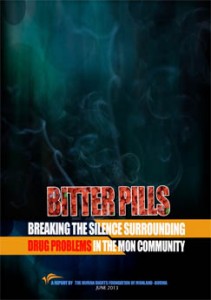New HURFOM report highlights use and trading of drugs in the Mon community
June 19, 2013
 The Human Rights Foundation of Monland (HURFOM) released a report on drug problems in the Mon community, drawing on testimony from 140 individuals. The report aims to give a preliminary account of drug use and trading in Mon populations, exploring issues that range from the causes of rising youth drug use to the New Mon State Party’s (NMSP) recent anti-drugs campaign. HURFOM’s aim is to encourage a new focus on the issue, breaking a long-held silence to call for collaborative action from all relevant authorities.
The Human Rights Foundation of Monland (HURFOM) released a report on drug problems in the Mon community, drawing on testimony from 140 individuals. The report aims to give a preliminary account of drug use and trading in Mon populations, exploring issues that range from the causes of rising youth drug use to the New Mon State Party’s (NMSP) recent anti-drugs campaign. HURFOM’s aim is to encourage a new focus on the issue, breaking a long-held silence to call for collaborative action from all relevant authorities.
Nai Aue Mon, HURFOM’s Program Coordinator, said, “Survey results have suggested that drugs are a big problem. Drug use has become common in our culture, but we don’t want this to be the case. We have decided to raise the issue by releasing this report. We would like to call on the government and political parties to take action immediately on drugs, as this issue is directly impacting our community.”
The report highlights that drugs are prevalent in Mon communities, and in particular are being abused by Mon youth. A man from Ye township is recorded as saying, “It is easy to buy drugs. We can buy them at the betel nut shop for around 3,000 to 5,000 kyat per tablet. It is easy to get drugs if you have friends in Koemine or Hnin Sone villages, or in Ye Township.”
The report also explains how corruption amongst various authorities has both enabled the rise of drugs in the Mon community and prevented effective action on the issue. According to one 32-year-old community volunteer from Kamarwat village, Mudon Township, “Most people want the drug problem to be dealt with. But who, or which organization, can make it stop when the military and authorities themselves are involved? Most of the people selling drugs are related to military forces, authorities and ceasefire groups.”
For the report, four HURFOM field researchers conducted interviews in Yebyu, Ye, Thanbyuzayat, Mudon and Moulmein Townships (all located in Mon State). Information was also obtained from partners in Paung (Mon State), Kyiakmayaw (Mon State), and Kyainnsiekyi (Karen State) Townships, although HURFOM field reporters did not themselves visit these areas. Interviewees included drug users and their families, students, monks, doctors, NMSP officials, members of the Karen National Union (KNU) and Democratic Karen Buddhist Army (DKBA), and officials from the Myanmar Police Force.
HURFOM notes that numerous difficulties were encountered in the process of collecting data for this report. The majority of drug users were unwilling to supply detailed accounts of their own experiences, fearing that giving testimony might lead to repercussions. NMSP, KNU and DKBA sources were in general hesitant in their disclosures. Of the 3 Myanmar Police Force officers interviewed, 2 were notably on the defensive and questioned the field reporter on who they were working for. In Mudon Township, reporters were physically prevented by Burmese military forces from accessing an area rumoured to be a hotspot of drugs trading. As a result, HURFOM emphasises that the report is in many ways incomplete and calls on CBOs, NGOs, grassroots organisations, armed groups, the Burmese government and international organisations to undertake further research on this pressing issue.
The Human Rights Foundation of Monland (HURFOM) was founded in 1995 by a group of young Mon people aiming to seek truth and justice for a peaceful democratic transition in Mon State in Burma. Since 2004, the Human Rights Foundation of Monland – Burma (HURFOM) has been one of the key member organizations of the Network for Human Rights Documentation – Burma. ND-Burma was formed in 2004 and is a multi-ethnic network providing a mechanism for Burma’s human rights organizations to collaborate on the human rights documentation process.
For more information, please contact: Nai Aue Mon, Program Coordinator, Human Rights Documentation and Dissemination Program, Human Rights Foundation of Monland – Burma (HURFOM).
Phone: +66 (0)86 167 9741
Email: auemon@gmail.com, monhumanrights@gmail.com
Full PDF copies of the report can be downloaded at: http://rehmonnya.org/upload/Bitterpills.pdf.
Hard copies of the report can be obtained by emailing monhumanrights@gmail.com.
Comments
Got something to say?
You must be logged in to post a comment.



















































